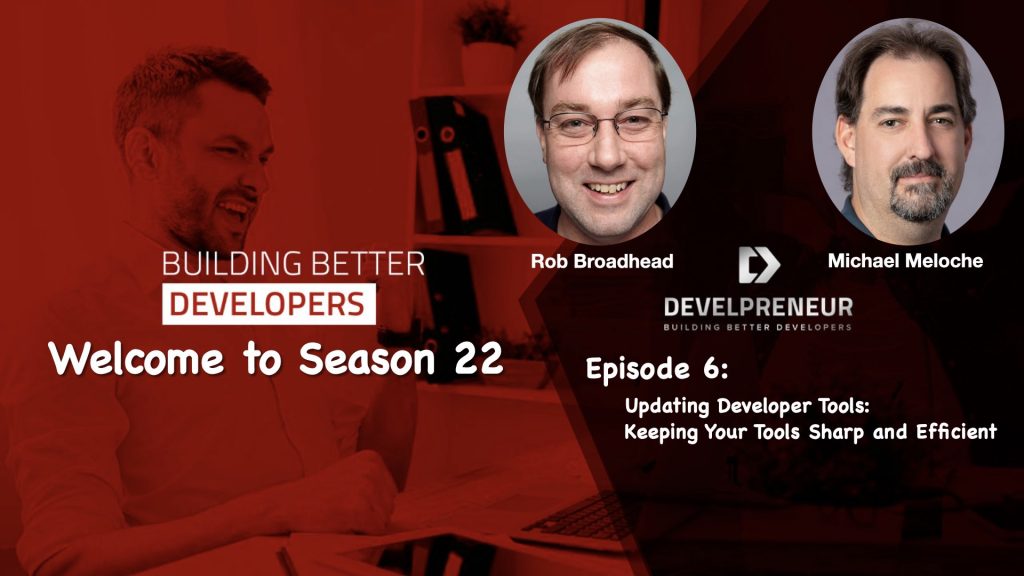Welcome back to another episode of our developer journey series. Picture us with our parkas, navigating through the blizzards of the ever-evolving tech landscape. This episode is dedicated to an essential part of every developer’s toolkit, “Updating Developer Tools: Keeping Your Tools Sharp and Efficient.”
The Constant Evolution of Developer Tools
As developers, we’re always in the thick of technological advancement. Whether you’re working within a niche or covering a broad spectrum of tech, there’s always something new on the horizon: new versions, libraries, problems, solutions, and add-ons. The saying goes, you could have ten years of experience or one year of experience ten times. We aim to ensure you accumulate a decade of progressive experience, not just repeated cycles.
Importance of Up-to-Date Developer Tools
Your developer tools are crucial for your growth and productivity. Many developers spend most of their time in one integrated development environment (IDE) like Eclipse, Visual Studio, or IntelliJ. If you’re still using basic editors like Vi for complex tasks, it’s time to upgrade. Modern IDEs offer features like syntax highlighting, autocomplete, and, increasingly, AI-assisted coding suggestions. These features can drastically reduce your time on repetitive tasks and boost your productivity.
Embrace Modern Developer Tools and Debugging
Modern IDEs come with powerful debugging tools. Setting up your environment to use debuggers effectively can save you countless hours. Instead of littering your code with print statements, use breakpoints and step through your code line by line. This method saves time and prevents production issues caused by excessive logging.
Regularly Updating Developer Tools and Processes
Twice a year, take inventory of your developer tools. Check your desktop and start menu for the applications you use frequently. Update them regularly to benefit from the latest features and improvements. Explore the extensions, plugins, and add-ons available for your IDEs and browsers. These can offer significant enhancements, from database management tools to integrations with email clients and version control systems.
Automation and Efficiency with Developer Tools
Evaluate your workflow periodically to identify repetitive tasks that can be automated. Numerous developer tools are available to streamline your processes. For instance, if you’re dealing with complex database schemas, tools like DBVisualizer and DBSchema can simplify your life by visually representing your database, turning hours of manual work into minutes.
Staying Current by Updating Developer Tools, Languages, and Environments
Whether you’re developing for mobile, web, or desktop, keeping up with the latest operating systems and platforms is crucial. Make sure your development environment is compatible with the latest versions. Developer tools like SonarQube can help you maintain code quality by performing static code analysis and highlighting potential vulnerabilities.
Continuous Improvement and Security with Developer Tools
Utilize developer tools that help you write better code. Modern IDEs can enforce coding standards, suggest improvements, and highlight potential security issues. Integrate these tools into your workflow to ensure you write clean, maintainable, and secure code.
In summary, keeping your developer tools and processes up to date is essential for becoming a better developer. Regularly review and update your IDEs, libraries, and other tools. Embrace new features and automation to boost your productivity. Stay current with the latest platforms and use tools that help you write secure and efficient code. By investing time in maintaining and improving your toolkit, you’ll be better prepared for the challenges of the ever-evolving tech landscape.
Stay tuned for more insights and tips on our developer journey series. Your feedback and thoughts are always welcome as we explore and navigate this dynamic field together.
Stay Connected: Join the Developreneur Community
We invite you to join our community and share your coding journey with us. Whether you’re a seasoned developer or just starting, there’s always room to learn and grow together. Contact us at [email protected] with your questions, feedback, or suggestions for future episodes. Together, let’s continue exploring the exciting world of software development.

